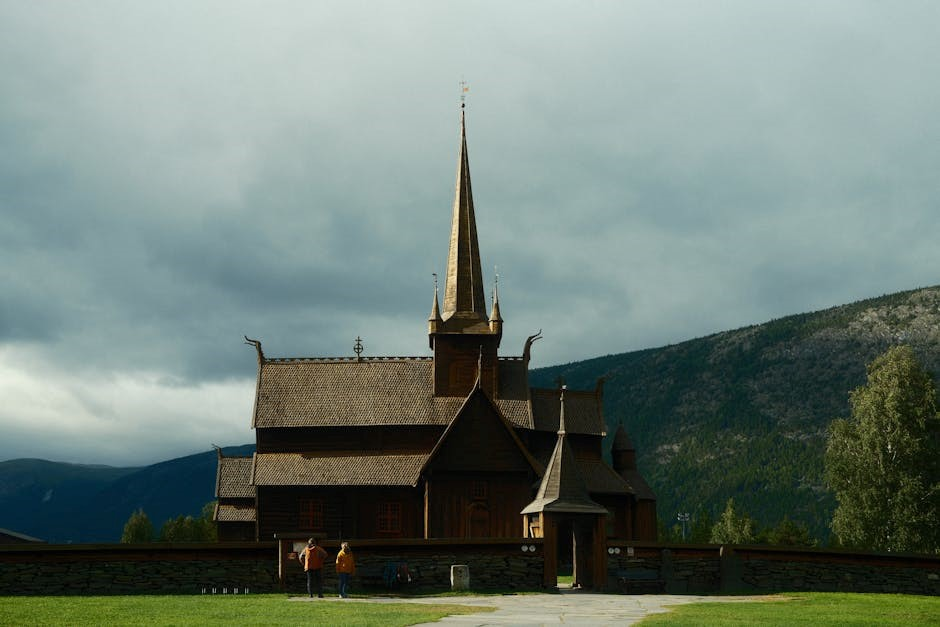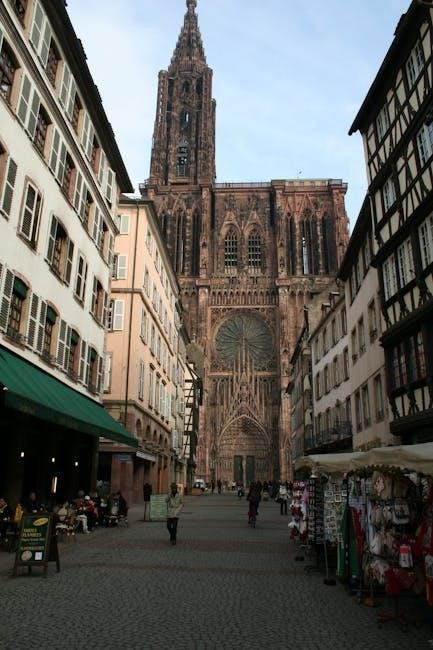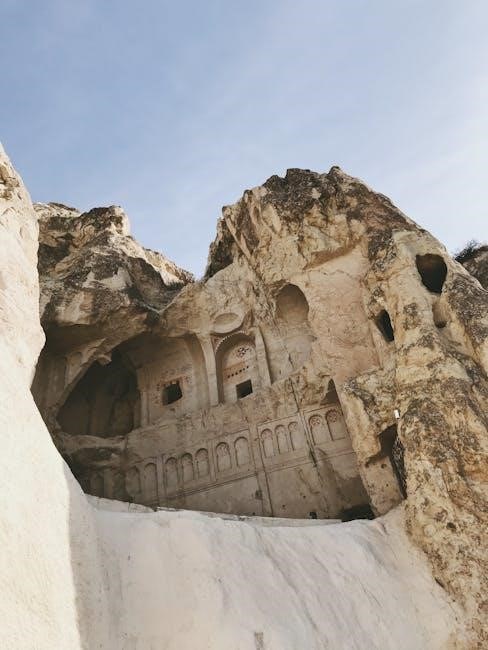A timeline of Christianity reveals the faith’s transformative journey‚ from Jesus’ life to global spread․ Key events like the Edict of Milan and the Council of Nicea shaped its course‚ illustrating how Christianity evolved into a worldwide movement‚ influencing culture‚ theology‚ and society for centuries․
Overview of Christianity’s Global Impact
Christianity’s global impact is profound‚ shaping cultures‚ societies‚ and histories worldwide․ From the Edict of Milan to the Council of Nicea‚ its influence spread rapidly‚ transforming art‚ architecture‚ and education․ The faith’s emphasis on compassion and justice inspired social reforms‚ while its theological debates shaped Western philosophy․ Today‚ Christianity remains a cornerstone of global culture‚ with its legacy visible in literature‚ ethics‚ and institutions․ Its adaptability across diverse societies underscores its enduring relevance‚ making it one of history’s most influential religions․
Importance of Studying Christian History
Studying Christian history is essential for understanding its development and global influence․ It corrects misconceptions‚ providing a clearer understanding of its origins and evolution․ By examining key events‚ such as the Edict of Milan and the Council of Nicea‚ one gains insights into how Christianity shaped cultures‚ societies‚ and theology․ This study also reveals the faith’s adaptability and its role in shaping art‚ literature‚ and ethics․ Understanding Christian history fosters a deeper appreciation of its impact on the modern world and its continued relevance in shaping global cultures and beliefs․
Key Themes in Christian Historical Development
Christian history is marked by themes of survival‚ adaptation‚ and transformation․ From its origins as a persecuted sect to its rise as a global faith‚ Christianity has navigated periods of rapid expansion‚ theological debates‚ and cultural shifts․ The struggle for orthodoxy‚ the role of missionary work‚ and the interplay between faith and politics are central themes․ Additionally‚ the faith’s ability to adapt to diverse cultures while maintaining core beliefs has been a recurring pattern‚ shaping its enduring influence across centuries and continents․

The Life and Teachings of Jesus Christ
Jesus’ life‚ teachings‚ crucifixion‚ and resurrection form the cornerstone of Christianity․ His message of love‚ forgiveness‚ and salvation‚ as recorded in the Gospels‚ transformed human history․
The Birth and Early Life of Jesus
Jesus was born circa 4 BC in Bethlehem to Mary and Joseph‚ as foretold by prophets․ His early life‚ including the flight to Egypt and upbringing in Nazareth‚ shaped his mission․
Jesus’ Ministry and Teachings
Jesus’ ministry lasted approximately three years‚ beginning with baptism by John the Baptist․ He preached the Kingdom of God‚ emphasizing love‚ forgiveness‚ and compassion․ His teachings‚ delivered through parables like the Good Samaritan and the Prodigal Son‚ challenged societal norms․ Miracles‚ such as healings and the resurrection of Lazarus‚ demonstrated divine authority․ Jesus’ message of salvation and his call to follow God’s will attracted followers and sparked controversy‚ ultimately leading to his crucifixion․ His teachings remain central to Christian faith‚ inspiring millions worldwide․
The Crucifixion and Resurrection of Jesus
The crucifixion of Jesus‚ occurring around 33 AD‚ was a pivotal event in Christian history․ He was crucified by Roman authorities‚ a sacrifice seen by Christians as atonement for humanity’s sins․ His resurrection on the third day‚ celebrated as Easter‚ is central to Christian faith‚ symbolizing victory over death and sin․ This event marked the foundation of Christianity‚ inspiring followers to spread his teachings globally․ The resurrection is viewed as proof of Jesus’ divinity and the promise of eternal life‚ shaping Christian theology and practice for centuries․
The Early Christian Church
The early Christian church emerged after Jesus’ resurrection‚ growing rapidly from a small group of followers․ It expanded despite persecution‚ establishing communities across the Mediterranean‚ laying the foundation for a structured religious institution․
The Apostolic Era and the Spread of Christianity
The Apostolic Era‚ following Jesus’ resurrection‚ marked the birth of Christianity․ Apostles like Peter and Paul preached the Gospel‚ establishing churches across the Mediterranean․ Despite persecution‚ Christianity spread rapidly‚ fueled by missionary journeys and the Great Commission․ The conversion of Paul and the inclusion of Gentiles expanded the faith beyond Jewish communities․ Key events like Pentecost and the Jerusalem Council solidified early Christian practices․ This period laid the foundation for Christianity’s global expansion‚ transforming it from a local movement into a universal religion․
The Role of the Roman Empire in Early Christianity
The Roman Empire played a pivotal role in shaping early Christianity․ Initially‚ it persecuted Christians‚ viewing them as a threat to imperial authority․ However‚ Emperor Constantine’s Edict of Milan in 313 AD marked a turning point‚ granting religious tolerance and ending persecution․ This shift allowed Christianity to spread freely within the empire․ The Roman infrastructure facilitated missionary work‚ while its legal framework provided stability for the growing faith․ Over time‚ Christianity became intertwined with Roman culture‚ laying the groundwork for its rise as a dominant world religion․
The Persecution of Early Christians
Early Christians faced severe persecution under Roman rule‚ often viewed as a threat to imperial authority․ The Roman Empire’s religious tolerance did not extend to Christianity‚ leading to widespread suffering․ Key events‚ such as the crucifixion of Jesus and subsequent executions of apostles‚ marked the early struggles․ Emperor Nero’s reign saw brutal crackdowns‚ while later emperors like Diocletian intensified persecution․ Despite this‚ Christianity persisted‚ with martyrs becoming symbols of faith․ The Edict of Milan in 313 AD finally ended this era‚ paving the way for Christianity’s growth within the empire and beyond;

Christianity and the Roman Empire
Christianity transformed from a persecuted faith to the empire’s official religion․ The Edict of Milan (313 AD) ended persecution‚ while the Council of Nicea (325 AD) unified doctrine‚ and Constantinople emerged as a Christian center‚ reshaping the empire’s spiritual landscape․
The Edict of Milan and Religious Tolerance
The Edict of Milan‚ issued by Emperor Constantine in 313 AD‚ marked a pivotal moment in Christian history․ It granted religious tolerance‚ ending persecution and allowing Christians to practice openly․ This decree not only protected Christianity but also promoted coexistence with other faiths‚ reshaping the Roman Empire’s religious landscape․ The edict’s significance lies in its role as a catalyst for Christianity’s spread and its establishment as a dominant force within the empire‚ fostering an era of relative peace and religious freedom․
The Council of Nicea and the Nicene Creed
In 325 AD‚ Emperor Constantine convened the Council of Nicea to address the Arian controversy‚ which questioned Jesus’ divinity․ The council affirmed Jesus as divine and of the same substance as the Father‚ leading to the Nicene Creed․ This creed became a foundational statement of Christian orthodoxy‚ uniting the church and establishing a theological framework that shaped Christianity’s doctrine․ The council’s decisions were pivotal in defining the Trinity and ensuring theological unity‚ making it a cornerstone of Christian history and belief․
The Rise of Constantinople as a Christian Center
Constantinople emerged as a central hub of Christianity after Emperor Constantine dedicated the city in 330 AD․ Its strategic location bridged Europe and Asia‚ facilitating the spread of Christian influence․ The city became a seat of religious authority‚ hosting major councils and fostering theological development․ The Hagia Sophia‚ a monumental church‚ symbolized its prominence; Constantinople’s rise solidified its role as a spiritual and political center‚ shaping Christianity’s expansion and enduring legacy as a crossroads of faith and culture for centuries․

The Middle Ages and the Rise of the Catholic Church
The Middle Ages saw the Catholic Church rise as a dominant force after the Western Roman Empire’s fall․ It unified Europe spiritually‚ with the Pope gaining central authority‚ shaping doctrine‚ and influencing society through monasteries and councils‚ becoming Christianity’s central institution․
The Fall of the Western Roman Empire and Christianity
The fall of the Western Roman Empire in 476 CE marked a pivotal moment for Christianity․ As the empire’s political and military structures crumbled‚ Christianity spread rapidly‚ filling the void left by Rome’s decline․ The Edict of Milan (313 CE) had already legalized Christianity‚ and by the 5th century‚ it had become the dominant faith․ The Church stepped in to preserve Roman culture and governance‚ establishing itself as a unifying force․ This period laid the groundwork for the Church’s central role in medieval Europe‚ shaping both spirituality and society for centuries to come․
The Role of Monasticism in Preserving Christian Tradition
Monasticism played a crucial role in preserving Christian tradition during the Middle Ages․ Monasteries became centers of learning‚ where monks meticulously copied and preserved religious manuscripts‚ ensuring the survival of Christian teachings․ These communities maintained liturgical practices‚ theological writings‚ and moral guidelines‚ serving as guardians of faith during times of instability․ By dedicating their lives to prayer‚ study‚ and service‚ monks upheld the intellectual and spiritual legacy of Christianity‚ laying the foundation for its enduring influence in European society and beyond․
The Crusades and Their Impact on Christian-Muslim Relations
The Crusades‚ a series of military campaigns from the 11th to 13th centuries‚ profoundly strained Christian-Muslim relations; Initiated by Western Christians to reclaim the Holy Land‚ these conflicts led to widespread violence‚ fostering lasting mistrust and hostility․ The Siege of Jerusalem in 1099 and subsequent battles highlighted religious tensions‚ creating a legacy of animosity․ While some interactions remained peaceful‚ the Crusades largely entrenched divisions‚ shaping a complex and often adversarial relationship between Christianity and Islam that persists in modern times‚ influencing cultural and political dynamics across the globe․
The Protestant Reformation
The Protestant Reformation‚ emerging in the early 16th century‚ was sparked by figures like Martin Luther and John Calvin‚ leading to a break with the Catholic Church and the rise of Protestantism․
Key Figures of the Reformation: Martin Luther and John Calvin
Martin Luther‚ a German theologian‚ sparked the Reformation with his Ninety-Five Theses in 1517‚ challenging Catholic practices like indulgences․ John Calvin‚ a French reformer‚ developed Calvinism‚ emphasizing predestination and strict moral codes․ Both figures reshaped Christian theology‚ leading to the emergence of Protestant denominations․ Their writings‚ such as Luther’s Ninety-Five Theses and Calvin’s Institutes of the Christian Religion‚ became foundational texts‚ influencing religious and societal changes across Europe and beyond․
The Break with the Catholic Church and the Emergence of Protestantism
The Reformation marked a pivotal break with the Catholic Church‚ driven by corruption and theological disputes․ Martin Luther’s Ninety-Five Theses (1517) criticized indulgences‚ sparking widespread dissent․ Supported by local princes‚ Protestantism emerged‚ rejecting papal authority and emphasizing individual faith․ This schism reshaped Christianity‚ leading to the division of Western Christianity into Catholic and Protestant branches․ The movement gained momentum‚ fostering religious‚ political‚ and cultural transformations across Europe and beyond‚ forever altering the Christian landscape․
The Reformation’s Impact on European Society and Religion
The Reformation profoundly reshaped European society and religion‚ challenging Catholic authority and fostering religious diversity․ It sparked theological debates‚ encouraged literacy through vernacular Bibles‚ and empowered local governance․ The printing press amplified reformers’ ideas‚ spreading them widely․ This era saw the rise of Protestant denominations‚ altering religious landscapes and influencing social structures․ The Reformation also led to conflicts‚ such as the Thirty Years’ War‚ but ultimately promoted individual faith and intellectual freedom‚ leaving a lasting legacy on Western Christianity and culture․
Christianity in the Modern Era
Christianity in the modern era reflects globalization and diversity‚ with growing movements like evangelicalism and Pentecostalism․ It faces challenges from secularism yet remains a influential global force․
The Enlightenment and Its Challenges to Christianity
The Enlightenment era posed significant challenges to Christianity‚ emphasizing reason over revelation and individualism over tradition․ Thinkers like Voltaire and Rousseau questioned religious authority‚ promoting secularism and humanism․ The scientific revolution further eroded trust in biblical explanations‚ leading to critiques of miracles and divine intervention․ This period saw the rise of deism‚ which rejected supernatural elements of Christianity․ The Church faced growing skepticism‚ particularly regarding its historical claims and moral teachings․ These challenges forced Christianity to adapt‚ sparking theological debates and reforms that continue to shape its role in modern society․
The Rise of Evangelical and Pentecostal Movements
The rise of Evangelical and Pentecostal movements transformed modern Christianity‚ emphasizing personal conversion‚ biblical authority‚ and spiritual experience․ Emerging in the 18th century‚ Evangelicalism stressed individual faith and missionary work․ The 20th century saw Pentecostalism’s explosion‚ marked by the Azusa Street Revival and the emphasis on the Holy Spirit’s gifts․ These movements grew rapidly‚ especially in the Global South‚ reshaping Christian demographics․ Their focus on charismatic worship and community engagement has made them influential forces in contemporary Christianity‚ blending tradition with modern expressions of faith․
Christianity in the 21st Century: Globalization and Diversity
Christianity in the 21st century is marked by unprecedented globalization and diversity․ The faith has shifted demographically‚ with rapid growth in Africa‚ Asia‚ and Latin America‚ while declining in some Western regions․ Globalization has fostered cultural exchange‚ blending traditional practices with modern expressions․ However‚ it also presents challenges‚ such as adapting to pluralistic societies and addressing secularism․ The rise of digital platforms has transformed how Christianity is shared and experienced․ This era highlights Christianity’s resilience and adaptability‚ as it navigates a complex‚ interconnected world‚ embracing both unity and diversity in its global expression․
Major Christian Schisms and Splits
Christianity has experienced significant schisms‚ such as the Great Schism of 1054 and the Protestant Reformation‚ leading to divisions like Eastern Orthodoxy‚ Catholicism‚ and Protestantism‚ reshaping its unity and diversity․
The Great Schism of 1054: Eastern Orthodoxy and Roman Catholicism
The Great Schism of 1054 marked a profound division between Eastern Orthodoxy and Roman Catholicism․ Disputes over papal authority‚ the Filioque clause‚ and cultural differences led to the split․ The Eastern Church‚ centered in Constantinople‚ rejected the Pope’s supremacy‚ while the Western Church affirmed it․ This schism‚ formalized in 1054‚ resulted in two distinct Christian traditions‚ shaping their theology‚ practices‚ and identities․ It remains a significant event in Christian history‚ highlighting the complexities of unity and diversity within the faith․
The Protestant Reformation and the Fragmentation of Christianity
The Protestant Reformation‚ sparked by Martin Luther’s 95 Theses in 1517‚ led to Christianity’s fragmentation․ Disputes over doctrine‚ such as justification by faith and papal authority‚ fueled the split․ Key figures like Luther and Calvin challenged Catholic teachings‚ resulting in the emergence of Protestantism․ This movement fragmented Christianity into numerous denominations‚ reshaping religious and social landscapes in Europe․ The Reformation’s emphasis on individual interpretation of Scripture further diversified Christian thought‚ creating a legacy of theological and ecclesiastical division that persists to this day․
Modern Denominational Divisions and Their Significance
Modern Christianity is marked by numerous denominational divisions‚ reflecting diverse theological‚ cultural‚ and doctrinal interpretations․ Groups like Evangelicals‚ Pentecostals‚ and Eastern Orthodox each emphasize unique aspects of faith․ These divisions highlight Christianity’s adaptability to global contexts but also present challenges for unity․ The rise of independent churches and megachurch movements further complicates the landscape․ Despite differences‚ these divisions underscore the dynamic nature of Christianity‚ allowing it to resonate with varied cultures and societies‚ ensuring its relevance in a rapidly changing world while fostering both cooperation and tension among its adherents․
Theological Developments in Christianity
Christian theology evolved through councils and key figures‚ shaping doctrines like the Trinity and Christ’s nature․ Theologians such as Augustine and Aquinas profoundly influenced these developments․
The Development of the Trinity Doctrine
The Trinity Doctrine‚ defining God as Father‚ Son‚ and Holy Spirit‚ emerged through early church councils․ The Council of Nicea (325 AD) and Chalcedon (451 AD) were pivotal in formalizing this belief․ These gatherings addressed controversies like Arianism‚ ensuring Jesus’ divinity․ The Nicene Creed‚ established at Nicea‚ became a cornerstone of Trinitarian theology․ Over centuries‚ theologians like Augustine and Aquinas refined the doctrine‚ solidifying its central role in Christian theology․ This concept remains a foundational tenet‚ shaping Christian worship‚ art‚ and philosophy to this day․
The Role of Councils in Shaping Christian Theology
Christian councils‚ such as Nicea (325 AD) and Chalcedon (451 AD)‚ played a crucial role in defining doctrine and resolving theological disputes․ These gatherings brought together church leaders to address heresies and establish unified beliefs․ The Council of Nicea‚ for instance‚ affirmed Jesus’ divinity through the Nicene Creed‚ while Chalcedon defined Christ’s dual nature․ Such councils not only shaped the theological framework of Christianity but also fostered unity among diverse early Christian communities․ Their decisions remain foundational to Christian theology‚ influencing creeds and confessions across centuries․
The Influence of Major Theologians: Augustine‚ Aquinas‚ and Others
Augustine’s works‚ such as City of God‚ profoundly shaped Christian thought‚ emphasizing grace and divine sovereignty․ Thomas Aquinas integrated Aristotelian philosophy with theology in Summa Theologica‚ bridging faith and reason․ Other theologians‚ like Martin Luther and John Calvin‚ reshaped Christianity during the Reformation․ Their writings and ideas continue to influence Christian doctrine‚ ethics‚ and practices‚ leaving a lasting legacy in the development of Christian theology across centuries․

Christianity and Missionary Work
Christianity’s global spread began with apostolic missions‚ expanded during the Age of Exploration‚ and continues today․ Missionaries have played a pivotal role in sharing the Gospel worldwide‚ adapting to diverse cultures while spreading Christian teachings and values‚ leaving a lasting impact on societies and religions across centuries․
Early Christian Missions and the Spread of the Gospel
The early Christian missions began with Jesus’ apostles‚ who spread His teachings across the Mediterranean․ Figures like Paul and Peter traveled extensively‚ establishing churches and sharing the Gospel․ The Roman Empire’s infrastructure facilitated this spread‚ despite persecution․ The Edict of Milan in 313 AD marked a turning point‚ legalizing Christianity and enabling missionary work to flourish․ By the 5th century‚ Christianity had reached Britain and parts of Africa‚ laying the foundation for its global expansion․ This period was pivotal in shaping the faith’s universal appeal and enduring legacy․
Missionary Work During the Age of Exploration
During the Age of Exploration‚ Christian missionaries accompanied European explorers‚ spreading the Gospel to new lands․ Catholic orders like the Jesuits and Franciscans played a central role‚ establishing missions in the Americas‚ Africa‚ and Asia․ Figures like Francis Xavier and Bartolomé de las Casas were instrumental in converting indigenous populations․ This period saw the establishment of churches and the adaptation of Christian practices to local cultures‚ though it also brought challenges‚ including cultural suppression and exploitation․ Missionary efforts during this era significantly expanded Christianity’s global reach‚ shaping its diverse presence in the modern world․
Modern Missionary Movements and Their Global Impact
Modern missionary movements have embraced new strategies‚ leveraging technology and globalization to spread Christianity․ Evangelical and Pentecostal groups have led the charge‚ establishing churches and ministries worldwide․ Organizations like Wycliffe Bible Translators focus on translating Scripture into indigenous languages‚ ensuring cultural relevance․ While these efforts have expanded Christianity’s reach‚ they also face criticism for cultural insensitivity․ Despite challenges‚ modern missionaries continue to play a pivotal role in shaping global faith communities‚ blending traditional evangelism with humanitarian efforts to address social and economic needs․

Christianity and Culture
Christianity profoundly shaped art‚ architecture‚ literature‚ and philosophy‚ inspiring iconic works like Gothic cathedrals and influential texts․ Its cultural legacy endures‚ influencing global traditions and values deeply․
The Influence of Christianity on Art and Architecture
Christianity has profoundly shaped art and architecture‚ inspiring iconic structures like Gothic cathedrals and Byzantine mosaics․ These creations symbolize divine glory‚ with intricate designs reflecting biblical narratives․ The cross‚ a central Christian symbol‚ became a dominant motif in art․ Religious themes dominated medieval and Renaissance art‚ with masterpieces like Michelangelo’s Sistine Chapel ceiling․ Churches and cathedrals‚ with their soaring vaults and stained glass‚ became spaces for worship and communal reflection․ Christian art and architecture not only expressed faith but also preserved cultural and historical heritage‚ influencing Western civilization’s aesthetic and spiritual identity for centuries․
Christianity’s Role in Shaping Western Literature and Philosophy
Christianity has deeply influenced Western literature and philosophy‚ shaping themes‚ motifs‚ and moral frameworks․ Works like Dante’s Divine Comedy and Milton’s Paradise Lost reflect Christian theology․ Philosophers such as Augustine and Aquinas integrated Christian doctrine into their ideas‚ forming the foundation of Western thought․ The Bible’s narratives and teachings inspired countless writers‚ while Christian ethics influenced philosophical debates on morality and justice․ This profound impact continues to resonate‚ making Christianity a cornerstone of Western intellectual and literary heritage․
The Intersection of Christianity and Science
Christianity and science have had a complex‚ evolving relationship․ Early scientists like Isaac Newton and Galileo often saw their work as a way to understand God’s creation․ The Church initially supported scientific inquiry but later clashed with discoveries contradicting biblical interpretations‚ such as heliocentrism․ The Enlightenment emphasized reason‚ leading to tensions‚ yet many scientists remained devout․ Today‚ Christianity and science continue to interact‚ with ongoing debates about evolution‚ ethics‚ and the origins of life‚ reflecting a dynamic interplay between faith and reason in understanding the world․
Christianity’s enduring legacy is marked by its global influence‚ shaping cultures‚ ethics‚ and societies․ Its timeline‚ from Jesus to modern times‚ reflects a faith that continues to evolve and inspire‚ offering timeless spiritual guidance in a changing world․
The Legacy of Christianity in the Modern World
Christianity’s legacy in the modern world is profound‚ shaping ethics‚ social justice‚ and cultural values․ Its historical timeline‚ from ancient roots to global spread‚ underscores its enduring influence․ The faith’s emphasis on compassion‚ forgiveness‚ and human dignity continues to inspire millions․ Institutions like hospitals‚ schools‚ and charities often trace their origins to Christian teachings․ Art‚ literature‚ and philosophy have also been deeply impacted by Christian themes․ Today‚ Christianity remains a global force‚ adapting to modern challenges while preserving its core message‚ ensuring its relevance in a diverse and evolving world․
The Future of Christianity in a Globalized Society
Christianity’s future in a globalized world is shaped by cultural shifts‚ technological advancements‚ and increasing diversity․ As the faith spreads across continents‚ it faces opportunities for growth and challenges like secularism․ Evangelism and missionary work continue to play a role‚ while interfaith dialogue becomes crucial․ The rise of digital platforms allows for new forms of worship and outreach․ Despite these changes‚ Christianity’s core message of love and redemption remains central․ Its ability to adapt while preserving tradition will determine its influence in a rapidly changing‚ interconnected world․
Final Reflections on the History of Christianity
Reflecting on Christianity’s history reveals a faith shaped by resilience‚ adaptation‚ and divine purpose․ From its humble origins to its global influence‚ Christianity has navigated persecution‚ schisms‚ and cultural shifts․ Its timeline underscores the interplay of faith and history‚ showing how key events like the Edict of Milan and the Reformation reshaped the world․ Today‚ Christianity remains a dynamic force‚ inspiring billions․ Its legacy is a testament to enduring truths and the transformative power of love‚ offering hope for future generations in an ever-changing world․

